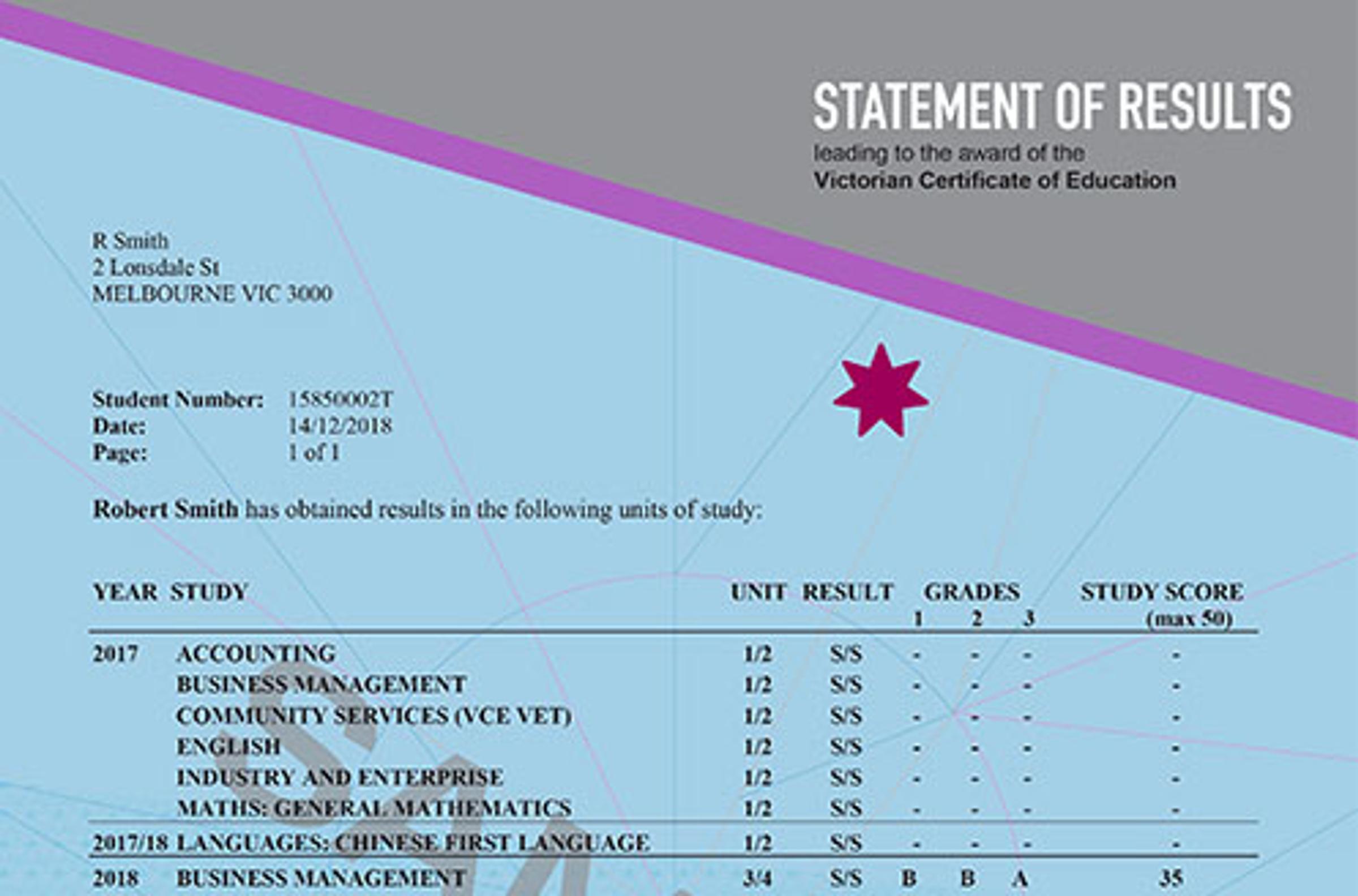Completion of the VCE

What is the VCE?
The Victorian Certificate of Education (VCE) is a certificate that recognises the successful completion of secondary education. It is an outstanding qualification that is recognised around the world. The VCE provides pathways to further study at university, Technical and Further Education (TAFE) and to the world of work. It is even possible to undertake a school-based apprenticeship or traineeship within the VCE.
To obtain your VCE, you must satisfactorily complete at least 16 units. The 16 units can include VET.
Regardless of how many units you do all together, a student must satisfactorily complete:
At least three (3) units from the English Group listed below:
- English or English as an Additional Language (EAL) Units 1 to 4
- English Language Units 1 to 4
- Literature Units 1 to 4
- No more than two Units at 1 & 2 level may count towards the English requirement. To gain an Australian Tertiary Admission Rank (ATAR) a student must complete both Units 3 & 4 of an English sequence
- Three sequences of Units 3 & 4 studies in addition to the sequence chosen from the English group. These sequences can be from VCE studies and/or VET programs.
Prerequisites for Unit 3 & Unit 4
While it is generally accepted that Units 1 & 2 help prepare students for the Unit 3 & 4 of any study, certain studies are very sequential.
Prior knowledge and skills acquired in Unit 1 &/or 2 are required before the following Unit 3 & 4 sequences can be attempted at MGSC: Chemistry, Physics, LOTE, Music and Mathematics.
The College makes every effort to run a Unit 3 & Unit 4 sequence of a study if the study ran as a Unit 1 & 2 sequence in the previous year. It is not anticipated a Unit 3 & 4 study will run if a class has not run as a Unit 1 & 2 at the College in the preceding year. The one exception is the offer of Outdoor and Environmental Studies Unit 3 & 4 to students in Year 11 in 2023.
A study that has not run this year in no way predicts whether the class will run at Year 11 next year, as each year classes are primarily determined by numbers of applicants.
Subject Preference Order
It is most important that students select the subjects they need or want the most, in preference order.
Timetable constraints will apply to some subject combinations and the Time-tabler computer program will place a student in her more highly preferred subject if there is a clash. Students who are excluded from Literature or English Language on this basis will be allocated to an English class.
In classes that are oversubscribed, a student who has completed Unit 2 of a study would normally have preference over a student picking up the study at Year 12 level.
Students may forfeit that priority if they select that study outside the top five or select a study not previously undertaken as a higher preference. Year 12 students have priority over Year 11 students in all Unit 3 & 4 classes
Assessment
Assessment in the VCE has two distinct aspects.
- Satisfactory completion of a unit
Each VCE Unit has a number of Learning Outcomes, determined by VCAA, which the student must demonstrate to their teacher that they have satisfactorily achieved. If the student is able to demonstrate this, the teacher will report a Satisfactory (S) for the outcome. A student must satisfactorily achieve all of the outcomes to pass the Unit.
- Grades
A teacher will design a number of tasks that will be used to assess each student’s level of achievement, or grade, in different parts of the course. These assessment tasks are called SACs (School Assessed Coursework) in Units 3 & 4. Strict guidelines for the criteria used to grade SACs are laid down by VCAA, however specific details as to the nature of the tasks can vary between schools. The subject teacher marks the SACs and the results are submitted to VCAA. In Units 3 & 4 external exams are an essential tool to determine grades. These exams are not set or marked by the class teachers. They do not determine if a student has satisfactorily achieved outcomes and are therefore not used to determine the S or N. However they do contribute significantly to the study score and therefore the subsequently derived ATAR.
It is possible, but unlikely, that a student could do well on their SACs but still not pass the unit, if SACs did not assess all of the required outcomes. They must therefore be careful to submit all work, not just their SACs. It is also possible a student may do poorly on an assessment task but still be able to demonstrate they have achieved an outcome and subsequently pass the Unit. It is important the student pays close attention to assessment requirements and due dates in each study to be sure she is satisfactorily completing them.
Authentication
The College and VCAA expect all work submitted by a student to be the student’s own work. The College has a number of procedures to ensure that work submitted will indeed be authentic. A student must follow all specific guidelines of an assessment. A student must not submit any part of another student’s work or allow another student to copy their work used for assessment. The student must not pass on information or solicit any information about a SAC from another student, or in any way gain an unfair advantage for themselves or another student. A student who is found to be in breach of a rule can have a range of sanctions imposed depending on the seriousness of the breach. These include loss of part or the entire grade for that assessment task, and possibly the awarding of a Non-Satisfactory assessment for the outcome being assessed. If any outcome for a study is deemed to be not satisfactorily achieved then the student will receive an ‘S for their overall assessment for that Unit.
Special Provision
Students who have or who, during the course of their VCE, develop circumstances that may affect their ability to perform in the VCE can have Special Provision to enable them to manage their VCE studies, assessment tasks and exams. The provision will depend on the nature of the difficulty. For example, for a chronic illness it may be appropriate to complete the VCE over three years. Certain conditions may require Special Exam Arrangements such as allowing rest breaks, or having a scribe or reader. Other situations may require rescheduling of assessment tasks or allowing extension of time to complete a task.
If an illness or personal trauma occurs during the exam period or within the two weeks preceding the exams for a Unit 3 or Unit 4 study, it is possible to apply for a Derived Exam Score (DES). Evidence from an independent source, such as a doctor, is required for a DES. If the application is approved by VCAA a grade for the exam or exams, will be derived. It will be based on information at the disposal of VCAA such as the student’s performance on the GAT, performance on SACs, and indicative grades supplied by teachers.
It is important that students keep the College informed of any circumstances that may warrant variation from the normal rules applying to any assessment procedure, so that timely and appropriate management of the situation can be achieved.
